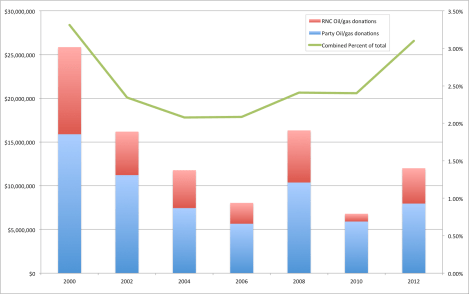The Washington Post created a graphic tracking how the Republican Party platform has changed on various issues over the years. The whole thing is worth a look — but we found this subsection interesting (for obvious reasons).
To break it out:
- 1988: The GOP recognizes climate change.
- 1992: The platform talks about funding to combat climate change.
- 1996, 2000: The party moves backward, citing “uncertainty” on the role of humans.
- 2004: The GOP commits to addressing climate. This is after Bush, up for reelection, kills involvement in the Kyoto Protocol.
- 2008: With candidate McCain, the party accepts a human role.
- 2012 (not on the graphic): The platform mentions climate only to mock Obama for considering it a security threat.
What has inspired this back-and-forth on their position? We have a theory.
Using data from OpenSecrets, we went back and looked at how the oil and gas industry has contributed to Republican politics since 2000. There have historically been two ways to give: to the Republican Party and to the Republican National Committee. The former is the party; the latter, its political arm. Here’s what those contributions have looked like.
The total dollar amounts are stacked. The red portion is contributions to the political committee and the blue portion to the party. The green line is the combined total of those as a percentage of all contributions received by the GOP.
In 2000, with Bush and oilman Cheney on the ballot, oil and gas was a heavy contributor. In 2004, as the party commits to fixing climate change, contributions drop. In 2008, facing a Democrat running on a green-jobs platform, contributions tick up despite ambivalence on climate. In 2012 — in an election cycle that is still ongoing — oil and gas contributions are nearly as high a percentage of contributions as in 2000.
Correlation, you will be reminded every day until you die, does not equal causation. Contributions from the oil and gas industry correlate loosely to how the Republican Party approaches climate change.
Do with this information what you will.






